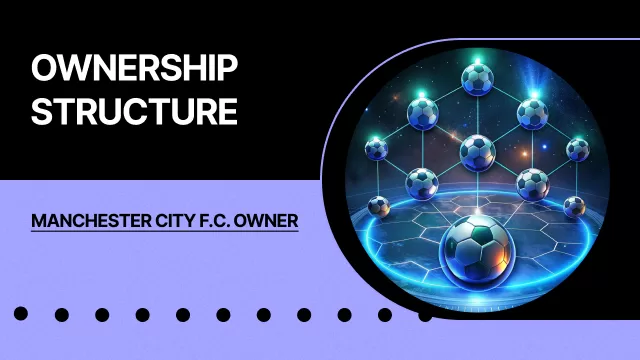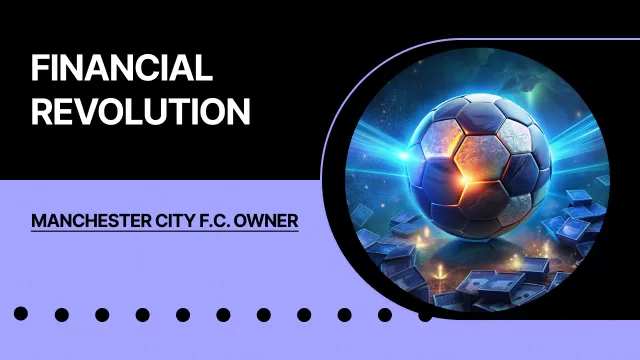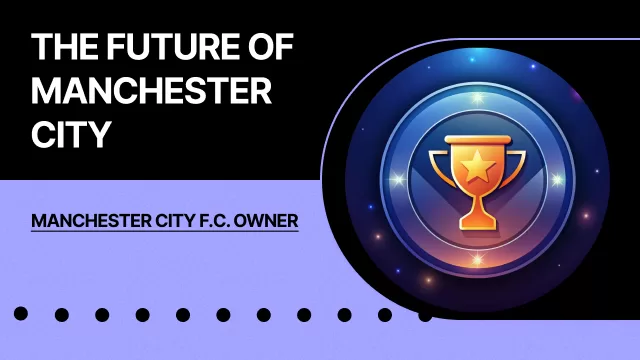If you follow football, the name Manchester City F.C. may ring a few bells as being one of the success stories in recent times (no matter how some people point out). Manchester City, a club that was virtually nothing before and who were participating in the English football league at some ground level of depth has treaded down an intriguing path to become what it is today — one of the most successful clubs globally.
Manchester City’s (r)evolution began when Sheikh Mansour bin Zayed al-Nahyan of the Abu Dhabi royal family acquired ownership of the club through his holding company, at that time known as the Abu Dhabi United Group. His purchase transformed the fortunes of Manchester City football club The club had its ups and downs until his acquisition, playing in Manchester Stadiums with a view to bagging major trophies. Atop of that numerous key look lands, Manchester City have lastingly restored the Premier League seven events notwithstanding really winning a couple included alongside each possibly more FA Cup and aside outing Cups under ownership Sheik Mansour.
The arrival of Sheikh Mansour as owner had an immediate impact The City Football Group, who control the purse strings and the strategy used developed by owner Sheikh Mansour’s advisors played their part in huge steps forward on and off the pitch. Manchester City were the first club in this era to win a league under that system, and did so by winning several consecutive Premier League titles. The club was not satisfied with only being successful domestically, the English team also wanted to achieve European success as well and Manchester City reached the final of Champions League.
That investment also spread outside Manchester, with the purchase of clubs such as Melbourne City and Mumbai City demonstrating a multi-club ownership model. In turn, the net worth of the club was soaring reflecting its achievements. A period of strategic expansion, vast investment and a winning ethos which would ensure Manchester City’s place in the annals of history.
Ownership Structure

Majority Shareholder: Abu Dhabi United Group
Indeed, Abu Dhabi United Group is the name that comes to mind when it comes to Manchester City’s meteoric ascent over recent years. This investment group of Sheikh Mansour bin Zayed Al Nahyan took over Manchester City back in 2008, entering a new era. Man City began barely an afterthought, eclipsed by the more celebrated successes of cross town rivals Manchester United prior to this sale. Enter the Abu Dhabi United Group and everything changed.
City were a mid-table outfit at best before being transformed into a global superpower by the riches of Sheikh Mansour, a member of Abu Dhabi’s royal family. It wasn’t just dollars spent to acquire players, but an investment in infrastructure that would support continued success. Which were greatly improved with the additions of The Etihad Stadium, state-of-the-art training facilities and youth academy. Their holistic strategy meant that the club was not just victorious on grass, but economic wise as well.
Abu Dhabi United Group investment quickly rewarded. We are talking about the year 2012, when Manchester City FC won their first Premier League title and this was just a start. The club has since gone on to win seven Premier League titles thanks in part to the backing of Sheikh Mansour, along with a number of FA and league cups. The Manchester City Club is the evidence of Abu Dhabi United Group’s vision and investment in English football as a whole.
City Football Group: An International Collection of Clubs
Certainly, this ability has been what is most creative about the stewardship of Manchester City – they established a new arm to their empire: the CFG (City Football Group). A global network of clubs that existed to help create linkages between different leagues, on a number of continents has been transformative in terms of the footballing world. The concept is quite obviously simple, while at the same time fairly revolutionary; own a club in multiple countries and leverage resources/scouting networks/player transfers.
Among its portfolio of clubs, The City Football Group owns sides such as Melbourne City FC, New York City FC and Mumbai City FC. This will give Manchester City the ability to enter not only different markets for commercial reasons but also in search of footballing talent. This club’s young players have a clear path to one of the most historic teams in world football, maintaining an established exposure and growth process.
The advantages of this multi-club ownership structure are enormous. For example young, inexperienced players can be loaned to the various sister clubs so they get a sense of what it is like playing first-team football. As well as coaching and player development best practices will also filter through the network. This approach has helped Manchester City become a dynamo within England and also globally.
Other Contributors: Minority Owners and Investors
But the Abu Dhabi United Group is the main owner, though they are not alone in possessing an interest in Manchester City. Over the years, the club has managed to bring in a considerable investment from different quarters making it financially stronger. Silver Lake, the US private equity firm that took a 10 per cent stake in City Football Group last year is among significant investors. It was a move which brought immediate financial muscle and power in terms of knowledge in technology, marketing and media – all key components moving forward for the modern game.
Minority owners and investors are extremely important to the financial stability of a club. They generate revenue that can be spent on anything from building infrastructure to buying players. Plus, it dilutes risk – insulating the club from becoming overly dependent on a single cashier.
The participation of these stakeholders has helped in increasing Manchester City’s popularity globally too. It allowed the club to exploit further commercial avenues through their connections in different markets as well as expert industries. And Man City’s strength is that they are supported by the diversified investment approach that makes them one of the most financially well backed clubs in the world.
Sheikh Mansour bin Zayed Al Nahyan
Owner Profile: Who is He, What Does he do for a Living & his Interests?
Sheikh Mansour bin Zayed Al Nahyan is a senior member of Abu Dhabi’s royal family. He is the half-brother of the current President of United Arab Emirates, Khalifa bin Zayed Al Nahyan and was born on November 20, 1970. And his money and reach is not just the result of being a royalty. He serves in several high-profile roles within the UAE government, these include Deputy Prime Minister and Minister of Presidential Affairs.
His fortune, believed to be in the billions and funded from oil money, stems mainly from Abu Dhabi. Some sectors in which he invests are energy, finance and sports. In addition to Manchester City, he is the largest shareholder of another football club globally under his umbrella group called the City Football Group; and also has investments in horse racing and other sports.
Sheikh Mansour – the owner of Manchester City: The club’s low-profile backer His business and investments are strategically sound, said to be distantly visionary His passion for football, however questionable it may be, and the belief in his investments blossoming into profit is what fuels his interest. It’s these three things which have enabled Manchester City to evolve as they have.
Sheikh Mansour: The man with the vision for Manchester City
Sheikh Mansour had a genuine vision when he bought Manchester City: to make them one of the dominant clubs in both England and Europe. This vision was not about winning championships; it was a legacy. It has been a journey that demonstrated Sheikh Mansour’s intent from the very start. He not only invested in a world-class team, but also ensured the club had all the right facilities and coaching staff including youth development programs.
A long-term objective of Sheikh Mansour’s was to ensure that Manchester City can rely on their own resources. This included the creation of a commercial package which provided substantial earnings via agreements with brands alongside fan engagement around the world. The formation of the City Football Group was part and parcel of this in terms that it opened up fresh markets to the club, thus letting them build a global reach among supporters as well.
Since becoming Man City owner, Sheikh Mansour has transformed the club into not only an English powerhouse but also a heavyweight on the European stage. The club has been a regular in the Champions League each year, even making it to the final and enhancing its status as an elite team. Sheikh Mansour’s vision has changed a mid-table side to one with aspirations of continued glory among the best global challengers, and so Manchester City will no doubt be touched in particular.
The Effect: Reshaping the Club’s Future
There is no doubt about just how influential Sheikh Mansour’s ownership has been for Manchester City. His investment and long-term vision have resulted in the good fortune of this great club both on del pitch, as well as financial stability. Manchester City were not well known for winning trophies before his acquisition. Nowadays the club can boast several Premier League titles, FA Cups, a couple of Carabao cups and even have themselves a Champions League title.
The greatest change to have emerged from Sheikh Mansour’s ownership has been the transformation of Manchester City’s infrastructure. The Etihad Stadium, the City Football Academy and support facilities can now lay claim to being among the best in their class. This investment in infrastructure has led to both improved first-team performances and an almost continual production line of young talent.
Not everyone has benefited from Sheikh Mansour’s ownership at the club economy-wise. Today Manchester City is one of the Highest Income generating football clubs in the World, revenue coming from Commercial deals and Sponsorships as well global Fan Bases. The financial health of the club has enabled it to continually attract top-level talent and be among Europe’s elite year in, year out.
In addition, the ownership of Sheikh Mansour has given Manchester City a worldwide brand. The club is a global phenomenon now, with fans worldwide. Bolstering this presence has been the City Football Group’s web of clubs, which have not just turned Manchester City into a football club but also a global sports brand.
Financial Revolution

Player Investment: Developing an Elite Squad
When Sheikh Mansour bin Zayed Al Nahyan, the deputy prime minister of UAE and part of Abu Dhabi’s royal family became owner for Manchester City F.C. Everyone stood up to listen to what he had said or commented on, such as the football world was taken by surprise. The game really changed with his acquisition by the Abu Dhabi United Group. Buoyed by what appeared to be bottomless financial resources, Galifi took the club in a completely new direction. One of the most visible aspects of this transformation was a move for some truly world-class players.
After the signing of top talents such as Kevin De Bruyne, Manchester City FC started to assemble a squad that could compete for success at both domestic and European level. The club invested heavily and splashed money on big names to compete in the Premier League, which paid off. The club collected seven Premier League titles and a host of FA Cups, League Cup among other trophies under his ownership. But Manchester City brought these players in with the help of significant cash injections from Sheikh Mansour, and that level of financial stability is only afforded to a few clubs throughout the world.
Infrastructure Development: Etihad Campus and Academy
It wasn’t all about the players, though. The infrastructure development has been just as striking under Sheikh Mansour’s ownership. If it was not for the Etihad Campus, which is arguably one of the current best facilities worldwide, Manchester City might still be operating out-dated conditions. The world-class stadium is completed with Grand Etihad Stadium and top-notch training field as well as academy solely built to inflate upcoming stars.
We invested in the infrastructure which is about creating a sustainable future for the club. Manchester City FC were able to reduce expensive transfer fees by concentrating on the development of youth prospects. The Etihad Campus is the embodiment of Sheikh Mansour’s aim to build something that outlasts mere success at game level. It is to create infrastructure that will sustain the club for generations.
Winning Business: Sponsorship & International Brand
City have prospered on the field but are now a commercial giant since being taken over by Sheikh Mansour. That global network of clubs has also grown to encompass Melbourne City and Mumbai City with the latter just months away from its debut in the Indian Super League. That multi-club ownership is one of the strategies Manchester City rely on to strengthen their global branding and tap into new revenue streams.
Over the years, sponsorship deals have played a key role in achieving commercial success. One of the major enhancements being done at PSG is in their financial balance due to partnerships with corporations such as Etihad Airways. These sponsorships have both helped in terms of financial support but they have also boosted the reputation and brand towards Manchester City being seen as a global football giant. The club has won a lot of fans and market share in the long-term effort, you could be very observant when paying attention to their commercial strategy that is to create a brand which can belong worldwide.
Controversies and Criticisms

An Insight On Financial Fair Play: Rules And Issues
Yet the financial revolution at Manchester City has not been without its controversies. The club has come under scrutiny and criticism, mainly over FFP regulations. Placed by UEFA, these regulations are meant to rule out clubs spending more than they earn and enforce economic stability.
Manchester City had to tread the rules carefully. Allegations and investigations have intensified in recent months over financial dealings of the club, including inflating sponsorship deals to balance books. The controversies have not only overshadowed their successes, but also forced the club into avoiding serious consequences. Staying with FFP has always been a major challenge but no less so for Sheikh Mansour.
Dealing with Sports Washing Allegations
One of the most common criticisms aimed at Manchester City’s owners is sportswashing. Opponents say the huge spend on football is one part of a wider plan to build Abu Dhabi and its ruling family an improved profile worldwide. The allegations hint that the investments in Manchester City and other football clubs are used to take away attention from human rights issues in the UAE, etc.
The allegations were later denied by Sheikh Mansour and the City Football Group, who said that they shared a genuine love for football as well as an enduring commitment to the clubs under their ownership. But despite these denials, the debate over sportswashing rumbles on, with some suggesting that Manchester City’s success on it off of cannot ever fully erase questions surrounding their ownership.
Maintaining Success and Sustainability on the Road Ahead
However, finding that fine line between success and sustainability is far from easy for Manchester City. While the club has received substantial financial investment for their rapid ascent, a note on long-term sustainability is crucial. Of course Sheikh Mansour’s vision is not just winning titles, he also wants the club to finance themselves and become a self-supporting organization.
This balance is delicate. The club is elated to be in the Champions League, but it cannot stop investing on both players and infrastructures as these will help them stay among the elite clubs from year after another. On the one hand, it cannot neglect financial regulations and make sure that its expenses are sustainable in the long term. The future of Manchester City will hinge on whether it can strike this balance and sustain the success while maintaining its fiscal integrity.
The Future of Manchester City

Selling with Salesforce | Part 5 – Maintenance and Protection of Success
And investment is the name of the game and if Manchester City are going to remain at this level then more money will have to be stumped up on players. We can be pretty sure that Sheikh Mansour is not about to give up on the club and there is no suggestion now of him withdrawing financial support. That further commitment is probably going to be spent keeping up an aggressive squad just as building more on the club’s foundation.
Also factoring into this will be the City Football Group’s strategy of diversifying investments across a host of clubs. This would enable Manchester City to develop talent and procure resources globally over time, which in effect secures a flow of players as well as financial investments. A combination of significant investment and worldwide infrastructural development is likely to underpin international growth strategy that in turn will ensure Real Madrid remains the inspiration for all football clubs.
City Football Group Expand Internationally
The City Football Group has wider ambitions than in Manchester. They were wanting to be a big network with clubs around the world who can lean on each other. The multi-club ownership model entails shared resources and talent development to be followed by a growth in the global footprint.
The purchasement of clubs such as Melbourne City, Mumbai CIty and others are a testament to this global drive. Every single one of these clubs strengthens the group as a whole, providing pathways to player development and commercial growth. This is likely to be a continuing investment and an expanding global strategy for the City Football Group with possible new acquisitions — and partnerships — that would entrench them even further in world football.
Legacy and Impact: Sheikh Mansour Vision
Sheikh Mansour of course has grand ambitions for Manchester City beyond instant glory. And English football’s modern history is littered with clubs who have tried to buy their way into the Premier League elite and ended up looking like amateurs outside a little tent erected around star-struck giraffes. He wants to leave a legacy that will forever impact the sport of football worldwide. It is a legacy that encompasses far more than what silverware has been collected, but the metamorphosis of Manchester City into one of the most successful global brands — and certainly an example in modern footballing stewardship.
This vision extends to investments in infrastructure, a global network of clubs and sustainability. Sheikh Mansour aims for Manchester City to leave as rich a legacy off the field as through their successes on it. The impact this had on the club and football will be seismic for generations to come.
Conclusion
To sum up, Sheikh Mansour and the Abu Dhabi United Group have forever changed Manchester City FC in their ownership of the club: transforming it into a human resources powered footballing juggernaut for good or ill. It has taken money, organization and global thinking but Manchester City went from dejected losers to the kings of football.
The role of infrastructure with respect to overseas growth and maintaining commercial relevance vis-a-vis this ownership model can also teach other clubs a thing or two. However, it also brings challenges, and as such controversies which touch on financial regulations to ethical considerations. Getting the blend between these factors right, will be key to both Manchester City’s future and football as a whole.
The legacy that goes beyond the pitch to be attached with Sheikh Mansour’s vision and commitment The success of Manchester City is a clear example for us on what can be made possible with the right resources and strategic approach. The model of modern football, a fist that few can challenge or evade in the age to come.

